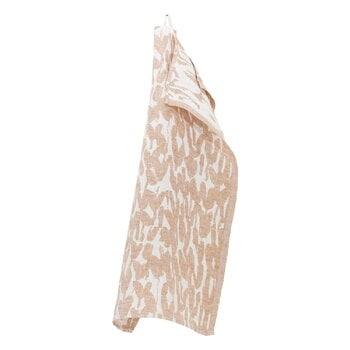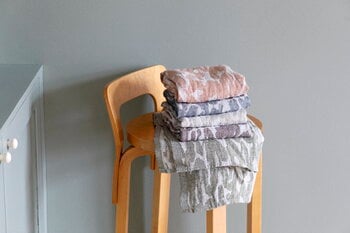The Jäkälä hand towel by Lapuan Kankurit is made of linen which is an absorbent, quick-drying and carefree material – the perfect choice for the bathroom as a hand towel or face towel but works also as a stylish kitchen towel. The hand towel is decorated with a beautiful pattern, designed by Saara Obele, that praises the Finnish forest and its secrets. The materials and accessories for the hand towel are sourced from Europe, mainly from Finland. The linen towel is woven in Finland at the own weaving mill of Lapuan Kankurit.
Jäkälä hand towel, white - cinnamon
Lapuan Kankurit
Description
The Jäkälä hand towel by Lapuan Kankurit is made of linen which is an absorbent, quick-drying and carefree material – the perfect choice for the bathroom as a hand towel or face towel but works also as a stylish kitchen towel. The hand towel is decorated with a beautiful pattern, designed by Saara Obele, that praises the Finnish forest and its secrets. The materials and accessories for the hand towel are sourced from Europe, mainly from Finland. The linen towel is woven in Finland at the own weaving mill of Lapuan Kankurit.
Product details (6)
- Material
- 100% European Masters of linen -linen
- Colour
- White, cinnamon
- Length
- 70 cm
- Width
- 48 cm
- Weight
- 100 g
- Care instructions
- Wash at 60°C
- Product ID
Designer
Saara Obele (b. 1984) is an illustrator and graphic designer. She studies visual communication design at Aalto University. Her work is inspired by colours, contrasts, patterns and Finnish nature with its changing seasons.
View all productsReviews (0)
Sustainability
The Product Sustainability Framework, our criteria of sustainable design, helps you find the most sustainable products in our selection. Read below which sustainability criteria this product has met.
Working conditions & labour 9/9
-
Equal opportunities for all employees
-
Commitment to UN Global Compact, fair compensation for all employees
-
Corporate responsibility requirements defined and communicated for suppliers
-
Systematic work for improved inclusion and well-being in the workplace
-
Transparent supply chain
-
Suppliers' compliance to a code of conduct ensured
-
Direct suppliers audited and certified
-
Compliance to the UN Guiding Principles on Business and Human Rights ensured in the supply chain
-
Support for community involvement in the supply chain
Eco-friendly production 9/9
-
Fair and resource-wise water-use in production
-
No incineration or landfilling of returned items
-
No use of endangered species as materials
-
No direct environmental emissions or waste (excl. GHGs) from production
-
The sustainability of direct suppliers' production is addressed and monitored
-
Production and material sourcing that respect biodiversity, animal rights, and natural ecosystems
-
Material-efficient and ecological packaging
-
Positive impact on nature’s well-being through operations that regenerate natural ecosystems
-
No potentially harmful chemicals used in own production
Climate impact 6/8
-
Company's direct greenhouse gas emissions identified and commitment to reduction
-
Product's carbon impact identified and commitment to reduction
-
Guidance on energy- and eco-efficient use of the product
-
Contribution to climate initiatives beyond the brand’s direct operations
-
Carbon footprint of the product calculated and goals set to reduce it
-
100 % renewable energy in own production and operations
Sustainable materials 6/6
-
Sustainable and long-lasting material choices
-
No harmful or hazardous substances
-
Responsible raw material sourcing and production
-
Materials suited for circularity: monomaterials, recyclable finishings, renewable or recycled contents etc.
-
Ecological materials: natural, biodegradable, recyclable or recycled contents
-
Outstanding materials in terms of innovativeness, responsibility, sustainability and circularity: local production or sourcing, 100 % recycled content, C2C-certification etc.
Circular design 5/5
-
High aesthetic quality promoting long-term use of the product
-
Technically durable product design and material choices
-
Design for enduring life-long quality
-
Design and support for product maintenance, repair and upgradability
-
Innovative circular design solutions: circular service system, resale platform, remanufacturing, collection of used products, etc.









